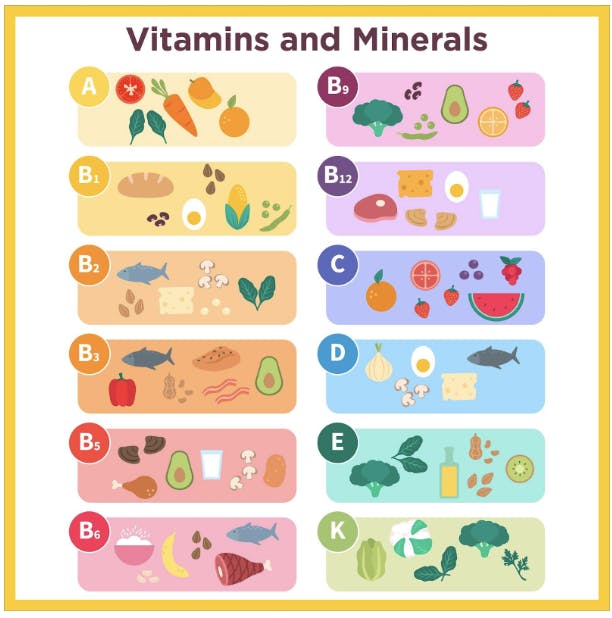TL;DR Science - Vitamins and Minerals
By Srishti S.
June 17, 2023 · 3 minute read
Medicine
Biology
Chemistry
Regardless of our age, we’ve always been told to eat balanced. Fruits and vegetables form a large part of that ideal diet. However, we don’t always think about why that is; sure, they’re healthy, but what makes them so important to our eating habits? What about proteins – what makes lean meats or lentils the central focus of many of our plates? The answer is pretty simple: all these foods are packed with nutrients.
What makes vitamins and minerals so beneficial as nutrients?

What are vitamins and minerals?
Well, vitamins are “organic molecules” (which simply means they contain the element carbon); minerals do not contain any carbon. All organisms need these nutrients to survive, but they serve a particular purpose in the human body. Vitamins and minerals are essential to carrying out regular bodily processes, from strengthening our teeth and bones to controlling our metabolism.
Vitamins vs. Minerals - What else makes vitamins and minerals different?
Because vitamins are organic substances, they come from living things like plants and animals. On the other hand, minerals come from nonliving things like the soil and water, and they are instead taken in by living organisms like plants.
Types of Vitamins
Vitamins come in two types: fat-soluble and water-soluble.
- Fat-soluble vitamins include vitamins A, D, E, and K. These vitamins dissolve in (you guessed it) fats, meaning they stay in the body and are often stored for later use. You do not need to replenish these as often.
- Water-soluble vitamins include the B-complex vitamins (B₆, B₁₂, etc.) and vitamin C. These vitamins dissolve in water and cannot be stored in the body for long; they exit the body through urination and must be replenished more often as a result.
There are 13 main vitamins: vitamin A, C, D, E, K, and of course, the eight B-complex vitamins (thiamin, niacin, riboflavin, pantothenic acid, biotin, B₆, B₁₂, and folate).
Types of Minerals
The seven main minerals the body needs are calcium, phosphorus, magnesium, sodium, potassium, chloride and sulfur.
Trace Elements
Trace elements are exactly what they sound like – elements that the body needs in trace amounts; these quantities are even smaller than the amounts of vitamins and minerals you need to survive. Some trace elements include iodine and selenium. (Hint: the others are also straight from the periodic table!)
*Refer to the image at the top of the article for an easy-to-follow yet comprehensive list of foods and their associated vitamin/mineral content!
How much do we need?
Vitamins and minerals are only needed in small amounts, contrary to popular belief. You should be able to get all the micronutrients you need simply by following a balanced diet, but some also choose to take supplements if necessary. For example, some groups of people such as the elderly are prone to vitamin D deficiency, so they may choose to take it in tablet or liquid form instead. There are also multivitamin gummies available on the market for people who want to ensure their levels are proper or boost their immune system. It is important not to go overboard with these though, as excess vitamins or minerals in the body’s system could lead to toxicity and symptoms like nausea or hair loss. Always consult your doctor if you have any concerns about your diet or nutrient levels.
TL;DR:
Vitamins and minerals are essential to the functioning of the human body. Though we only need them in small quantities, they play big roles in keeping our systems running smoothly. However, it is equally important to ensure we do not take in too much so that we can live a balanced life with a balanced plate.
Here is a great, in-depth video about vitamins and minerals if you want to learn more!
https://www.youtube.com/watch?v=ORmO23Ui5E4
Sources:
https://www.betterhealth.vic.gov.au/health/healthyliving/Vitamins-and-minerals#bhc-content
https://www.nhsinform.scot/healthy-living/food-and-nutrition/eating-well/vitamins-and-minerals
https://www.webmd.com/diet/guide/effects-of-taking-too-many-vitamins
Image Sources:
https://i.pinimg.com/originals/8a/cb/00/8acb00d77ce1ef803cf7b28a8bdb4b8b.jpg
Did you enjoy this article?
About The Author
Srishti Swaminathan is a high school sophomore interested in STEM and writing. She enjoys reading, listening to music, and watching movies. If you have any comments or questions regarding this article, feel free to contact her at srishti@sciteens.org.